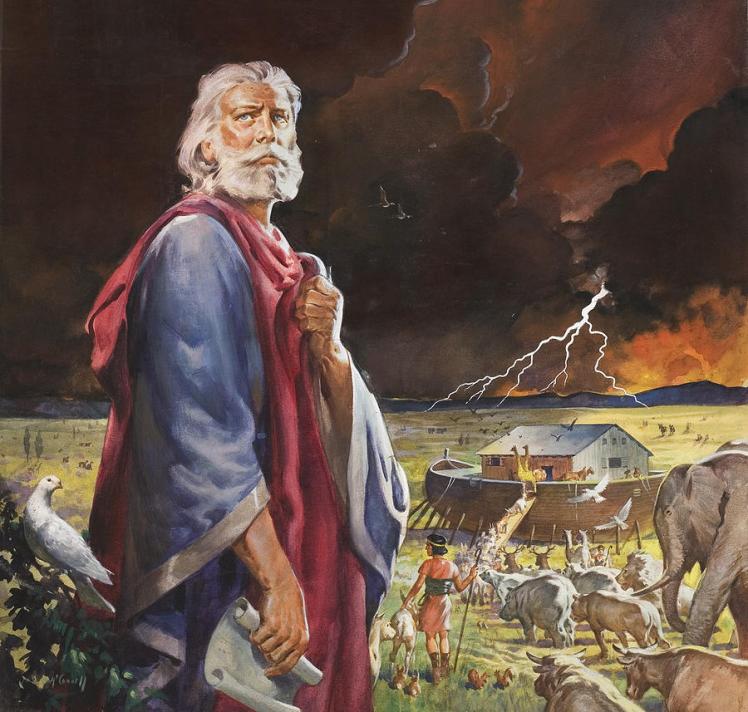Understanding the age of biblical figures can provide profound insights into ancient narratives and their significance. One of the most intriguing characters in the Bible is Noah, known for his pivotal role in the story of the Great Flood. The question of "how old was Noah when he died" often arises among scholars, theologians, and curious readers alike. This article aims to explore this query in depth, utilizing biblical texts and historical context to answer it thoroughly.
In the Book of Genesis, Noah is portrayed not only as a survivor of the Flood but also as a man who lived for centuries. His age at death is recorded in genealogies that serve as a bridge between the antediluvian world and the post-Flood era. This exploration will not only reveal his age but also reflect on the implications of such a long lifespan in biblical narratives.
This article will cover various aspects, including Noah’s age at different points in his life, the significance of his age in the biblical context, and what his lifespan signifies about human life and divine purpose. By the end of this exploration, readers will have a clearer understanding of Noah's life and its relevance to both history and theology.
Table of Contents
- Noah's Biblical Background
- Noah’s Age in Genesis
- Significance of Noah’s Age
- Comparison with Other Biblical Figures
- Cultural Perceptions of Lifespan
- Theological Reflections on Noah’s Age
- Myths and Misunderstandings
- Conclusion
Noah's Biblical Background
Noah is introduced in the Book of Genesis (Genesis 6-9) as the son of Lamech and a descendant of Seth. He is distinguished for his righteousness in a world filled with corruption and violence. His calling to build the Ark and save his family from the Flood underscores his role as a pivotal figure in the re-establishment of humanity post-Flood.
Biodata of Noah
| Attribute | Details |
|---|---|
| Name | Noah |
| Father | Lamech |
| Age at Flood | 600 years |
| Age at Death | 950 years |
Noah’s Age in Genesis
The Bible explicitly states that Noah lived for 950 years (Genesis 9:29). He was 600 years old when the Flood occurred. This remarkable age raises questions about the nature of longevity in the biblical narrative.
To understand Noah's age fully, one must consider the genealogies provided in Genesis, which outline the ages of various patriarchs. Noah’s lifespan, in particular, is significant when placed within the context of the ages of people before and after the Flood.
Significance of Noah’s Age
Noah's age is not just a number; it represents a theological and cultural framework within the biblical narrative. His long life can be interpreted as a testament to God’s grace, allowing Noah ample time to fulfill his divine mission.
- Divine Purpose: Noah’s age suggests a long period of preparation for the monumental task of building the Ark.
- Human Longevity: The long lifespans of early biblical figures reflect a time when humanity was believed to be closer to perfection.
- Symbol of Restoration: Noah represents the chance for a new beginning after the Flood, embodying hope and renewal.
Comparison with Other Biblical Figures
When comparing Noah’s lifespan with other biblical figures, it’s evident that he lived significantly longer than most. For instance, Abraham lived to be 175 years old, and Moses lived to be 120. This contrast highlights the unique position Noah holds in biblical history.
Cultural Perceptions of Lifespan
The long lifespans of biblical figures often reflect ancient cultural beliefs about life, death, and the divine. In many ancient cultures, including those of the Near East, long life was associated with divine favor and blessing.
Ancient Near Eastern Context
In the context of the Ancient Near East, the portrayal of long-lived figures served to emphasize their importance and the divine purpose behind their lives. This cultural perception shapes how one interprets biblical texts.
Theological Reflections on Noah’s Age
The life of Noah prompts various theological reflections. His age can symbolize the patience of God and humanity's potential for redemption. Additionally, it raises questions about the nature of life itself in God's creation.
Myths and Misunderstandings
Throughout history, various myths and misunderstandings have arisen regarding Noah and his age. Some may view his long life as a literal interpretation, while others see it as metaphorical, emphasizing spiritual lessons rather than factual details.
Conclusion
In conclusion, Noah lived to be 950 years old, with significant implications for understanding biblical narratives. His lifespan illustrates the themes of divine purpose, renewal, and the cultural context of ancient beliefs about life and death. As we reflect on Noah's life, we are encouraged to consider the broader messages of hope and redemption found within these ancient texts.
We invite you to share your thoughts in the comments below, engage with this article, and explore other insightful topics on our site!
Thank you for your time, and we look forward to welcoming you back for more enriching discussions and insights!
![How Old Was Noah When He Died? [Biblical Timeline]](https://i2.wp.com/www.findingdulcinea.com/wp-content/uploads/2023/06/How-Old-Was-Noah-When-He-Died-Biblical-Timeline-Finding-Dulcinea.jpg)



